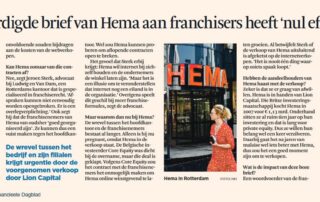Secretly another franchisee? Explanation contra proferentem
On 4 March 2015, the Court of Appeal of The Hague (ECLI:NL:GHDHA:2014:4601) issued a judgment on whether the franchisee should have been changed.
The franchise agreement stipulates that the franchise agreement may not be transferred to another person without the franchisor’s consent. Such clauses are common in franchise agreements. Often, and also in this case, there is a hefty contractual penalty for violating this provision. The idea behind this is that the franchisee wants to know exactly who the franchisee is and who is therefore also allowed to use the formula. In addition, it is in the franchisor’s interest to know exactly who to turn to in the event of non-compliance with the franchise agreement.
In the present case, the franchise agreement stipulated that a general partnership (a general partnership) was the franchisee. A partnership is a partnership of two or more persons. A BV can also be a partner. The difference between a general partnership and a BV is that a BV is an independent legal subject and a general partnership is not. Compare Section 2:5 of the Dutch Civil Code in combination with Section 2:175 paragraph 1 of the Dutch Civil Code and Section 18 of the Dutch Commercial Code, respectively.
After entering into the franchise agreement, one of the partners of the partnership had itself replaced by a BV. According to the franchisor, this created a (de facto) different contracting party than the franchisee with whom the contract was concluded. No permission was sought or granted by the franchisor. The franchisor claims the fine from the person who was previously a partner. After all, the rights under the franchise agreement have been transferred from a person to a legal entity, according to the franchisor.
The Court of Appeal ruled that if the franchisor had meant that a transfer of the company could also include a change of one of the partners, the franchisor must also formulate the relevant article in that sense. Since the franchisor had not done so, the fine cannot be claimed either. The franchise agreement, which the franchisor had drawn up, is interpreted to the detriment of the franchisor (contra proferentem) in view of the unclear explanation.
Franchisors would do well to draw up a franchise agreement with a legal expert. An unclear provision may be interpreted to the detriment of the author. In this case, the franchisor may have had a stronger legal position if, in addition to the general partnership, the partners had also been explicitly included as contracting parties.
Mr AW Dolphijn – Franchise lawyer
Ludwig & Van Dam Franchise attorneys, franchise legal advice. Do you want to respond? Mail to dolphijn@ludwigvandam.nl

Other messages
Late notification that no franchise agreement will be concluded
On April 11, 2017, EQLI:NL:GHARL:2017:3104, the Amsterdam-Leeuwarden Court of Appeal not only assessed the question of whether the negotiations on a franchise agreement to be concluded
Want to get rid of your franchise agreement in the meantime?
Franchise agreements are usually concluded for a longer period of time. How do you break open a franchise agreement?
HEMA in conflict with franchisees about e-commerce agreements
On 18 July 2018, the District Court of Amsterdam, ECLI:NL:RBAMS:2018:5098, rendered a judgment in proceedings on the merits in which the franchisees were largely ruled in favor of e-commerce.
mr. J. Sterk about HEMA conflict in the FD 18 July 2018
mr. J. Sterk about HEMA conflict in the FD.
Column Franchise+ – “Legal Franchise Statistics 2018”
The Legal Franchise Statistics have been compiled for 10 years by Ludwig & Van Dam attorneys on the basis of all published judgments of judges.
Franchisor prohibits opening (franchise) company
A franchisor applied for interim measures to prohibit a franchisee from opening a franchisee's business.






